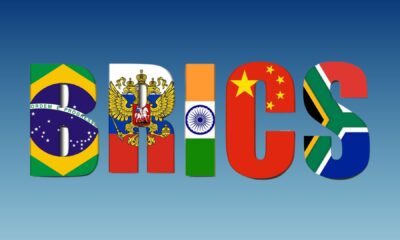Given the critical importance of financial inclusion to national development and building a sustainable economy, Group CEO Moniepoint Inc, Tosin Eniolorunda has reaffirmed his organization’s resolve in increasing financial inclusion and driving the adoption of technology by the underserved consumers in the country.
The Moniepoint boss was speaking on the sidelines of the 16th edition of Leadership Newspapers Conference and Awards where Moniepoint Inc received an award as the Fintech Company of the Year. The event, which took place at the Congress Hall of the Transcorp Hilton Hotel, Abuja also coincides with the 20th anniversary of founding of the Leadership Group. The selection of the award recipients followed a critical review of their various contributions to the growth and development of Nigeria, as laid down by the founding chairman of the LEADERSHIP Newspaper Group, the late Sam Nda-Isaiah.
The prestigious Fintech company of the year award recognizes Moniepoint’s innovative efforts to increase access to financial services for underserved and unbanked populations across Nigeria. Through its nationwide network of point-of-sale terminals and digital payments platform, Moniepoint has empowered millions of Nigerians, including petty traders and roadside businesses, to participate in the digital economy.
“We are immensely proud to receive this recognition from Leadership,” said Tosin Eniolorunda. “From the start, our mission has been to democratize financial services and create equal opportunities for every Nigerian to thrive. Powering dreams and ensuring that the large majority of our people irrespective of where they live experience financial happiness is our reason for being. This award validates our commitment to driving genuine financial inclusion in tandem with the government’s mandate and we are spurred to do more in terms of leveraging innovative solutions and technology to create more value for Nigerians.”
In her welcome remarks, Chairman, Leadership Newspapers, Zainab Nda-Isaiah signposted the role of the awards in recognizing individuals and organizations who are taking bold strides towards creating a more peaceful, stable, and prosperous nation. While paying homage to the legacy of the legendary and visionary Founder and her late husband, Sam Nda-Isaiah, she noted that awards spotlighted those considered deserving and exemplary in their various categories.
“We may not be where we would like to be, but these men and women are making strides in the direction that we hope will lead us to a nation of peace, stability, and the possibility of prosperity for all who dare to seize it”, Nda-Isaiah said.
Keynote presenter, Prof. Kingsley Moghalu, who was speaking to the theme, “An Economy In Distress: Which Way Forward?”, made a case for fixing the fundamentals and advised that the current economic crisis must not be allowed to go to waste.
“There is no better time to fix these challenges than now. The CBN’s policy actions are well intended and will serve to stabilize the macroeconomic environment. We must fully understand the causes that have led us to where we are and ensure that they are fixed by deploying real strategies.” He canvassed for property rights, innovation and access to capital as core pillars for a successful and productive economic growth.
Prominent personalities at the event include, Minister of Information and National Orientation, Mohammed Idris Malagi who represented awardee for Person of the Year, President Bola Ahmed Tinubu; presidential candidate of the Labour Party, Peter Obi, who received the Politician of the Year award; Governors Fr Hyacinth Iornem Alia of Benue State; Dikko Umaru Radda of Katsina State; Seyi Makinde of Oyo State and Mohammed Umar Bago of Niger State; Managing Director/CEO of First City Monument Bank Plc, Mrs. Yemisi Edun who received Banker of the Year Award and Salisu Auwalu, a keke rider from Kano who returned a bag containing 15m naira left in his tricycle, received an award as outstanding Young Person of the year.
It will be recalled that in 2023, Moniepoint MFB received the prestigious Rising Star Family Business Award Pwc/Businessday Family Business Summit; the Most Outstanding Microfinance Bank in Consumer Engagement at the Brandcom Awards, while Moniepoint Inc was listed for the second year running amongst the 100 most promising private fintech companies by CB Insights and the reputable Financial Times named it Africa’s second fastest-growing company. Moniepoint Inc also received critical acclaim as the “Most Outstanding Fintech Company in Financial Inclusion at the Brandcom Awards. Group CEO, Moniepoint Inc, Tosin Eniolorunda was named the 2024 Legit Business Leaders Awards in recognition of his outstanding contributions to Nigeria’s economy.

 Forex3 weeks ago
Forex3 weeks ago


 Naira2 weeks ago
Naira2 weeks ago
 Billionaire Watch2 weeks ago
Billionaire Watch2 weeks ago




 Naira2 weeks ago
Naira2 weeks ago




 Naira2 weeks ago
Naira2 weeks ago




 Naira1 week ago
Naira1 week ago




 Naira4 weeks ago
Naira4 weeks ago




 Naira3 weeks ago
Naira3 weeks ago






















